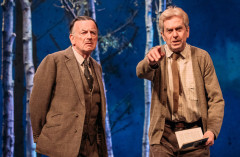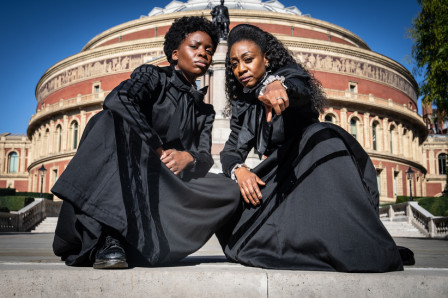Review: WHAT SHADOWS, Park Theatre
 At a time when the subject of immigration has re-emerged as a political hot potato - as it was in the late 1960s - WHAT SHADOWS (currently playing at The Park Theatre), examines the life of Conservative minister Enoch Powell, whose contribution to the debate about Englishness and national identity through his Birmingham ("Rivers of Blood") anti-immigration speech, marked him out as both an influential orator and one of the most divisive politicians of the 20th century.
At a time when the subject of immigration has re-emerged as a political hot potato - as it was in the late 1960s - WHAT SHADOWS (currently playing at The Park Theatre), examines the life of Conservative minister Enoch Powell, whose contribution to the debate about Englishness and national identity through his Birmingham ("Rivers of Blood") anti-immigration speech, marked him out as both an influential orator and one of the most divisive politicians of the 20th century.
It could be argued that the start of Chris Hannan's text is somewhat disjointed and slow to get moving; we are presented with scenes set in both the mid-to-late 60s and early 90s, and there is a fair amount of hopping back and forth throughout the play. But these contextual devices are necessary to frame and support the delivery of the notorious speech at the end of the first half, and a yet more powerful showdown at the play's end. The set is stark; a few silver birch trees rising from a rectangle of inky water, but otherwise actors conduct their exchanges and create the scenes on entirely black flooring... but the play itself is far from bleak or dour.
The intellectual merits of the piece are difficult to fault. Ian McDiarmid's embodiment of Powell is unnervingly on point - from the top of his slickly groomed hair and moustache, through to his facial expressions, poetic-yet-waspish vocal delivery, down to his tweedy three-piece suit and polished shoes. He is every inch the post-war, post-Imperial, Classics-educated academic, linguist and statesman. Hannan's well-researched script plays on Powell’s fondness for throwing Latin and Greek phrases into his witty rejoinders and McDiarmid relishes such moments, annunciating crisply when translating the meaning, for those lesser mortals in his presence. Sometimes his detachment leads you to wonder whether he is merely addressing himself, entirely impervious to the humanity nearby. Powell spoke over a dozen languages, held high ministerial office and viewed with bitterness India's partitioning and independence, having once harboured realisable ambitions to become Viceroy. Following the delivery of his Birmingham speech on which the play largely focuses, his fall from grace and political ostracism was as spectacular as the polarising effect it had on public sentiment towards him and the issue he had dared to address. He received many thousands of letters of public support following his sacking by Edward Heath and remained until his death, an erudite and wily combatant both in parliamentary debates and interviews on matters relating to sovereignty, Europe and immigration. The play reminds us that individuals (rather like race issues) are rarely simply black and white, and whilst it is easy to admire the man, it is also exceedingly difficult to like him.
As if to emphasise the societal rupture which resulted from Powell's speech, Hannan has created a foil in the guise of a young, female, second-generation, black Caribbean academic (Amelia Donker as Rose Cruikshank) who seeks to challenge and interrogate the ageing Powell in a bid to understand his motives in making the speech which ruined her childhood and changed, as she sees it, society's opinion toward her and all immigrants. We are also introduced to Clem Jones, (Nicholas Le Prevost) a journalist and long-time friend of Powell's who despite concerns about its content, agrees to help maximise coverage of the speech. This is done we learn, largely in a bid to placate his wife who fears the intellectual wilderness her life will become, should their friendship with the Powells falter. The wives (Paula Wilcox and Joanne Pierce) could so easily have assumed the status of mere window dressing to their menfolk, but buck the period and deliver some deftly-timed, observational one-liners (of the Noel Coward variety) as well as some shockingly anguished moments when the speech destroys the superficial veneer of friendship, exposing the enormous divergence of their respective opinions on race issues.
It would be remiss to ignore the parallel immigration debates which have occupied Britain over the past few years and not mention the vehement and seemingly irreconcilable divisions which the Brexit vote has revealed. Some will see this play as vindication of Enoch Powell's dire warnings; others will point to the irrefutable success of multiculturalism and social integration. Whatever your view, this play offers an opportunity to revisit one particularly momentous event and consider what lessons it may hold for us in these unchartered and tumultuous times.
WHAT SHADOWS continues at The Park Theatre, until 28th October.
Latest News

 SYLVIA Releases First Single, 'March Women March'
4 March 2026 at 17:04
SYLVIA Releases First Single, 'March Women March'
4 March 2026 at 17:04

 Full cast and creative team announced for World Premiere of PLEASE PLEASE ME
4 March 2026 at 16:18
Full cast and creative team announced for World Premiere of PLEASE PLEASE ME
4 March 2026 at 16:18

 Rehearsal Images Released for JAJA'S AFRICAN HAIR BRAIDING at Lyric Hammersmith Theatre
4 March 2026 at 15:05
Rehearsal Images Released for JAJA'S AFRICAN HAIR BRAIDING at Lyric Hammersmith Theatre
4 March 2026 at 15:05

 STICK MAN returns to London for 15th run this festive season
4 March 2026 at 12:06
STICK MAN returns to London for 15th run this festive season
4 March 2026 at 12:06
